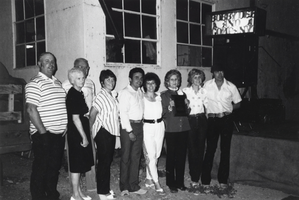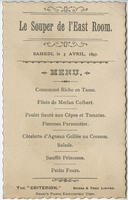Search the Special Collections and Archives Portal
Search Results

Los Angeles & Salt Lake Railroad standard eight room reinforced concrete bunk house: architectural drawing
Date
Archival Collection
Description
From Union Pacific Railroad Collection (MS-00397). The drawing shows elevations and sections of the bunk house. The bottom corner says, "Union Pacific System, L.A. & S.L.R.R. Standard Eight Room Reinforced Concrete Bunk House, Locations East Of Caliente. Ass't. Chief Engineers Office, Los Angeles. Drawn By F.W.G. Traced By F.W.G. Checked By W.V.L-B. Date June 1926. Scales As Noted. Revised Jan. 1927. April 1929. Drawing. No. 15634-B-."
Image

Proposed changes to present Los Angeles & Salt Lake Railroad frame depot, Caliente, Nevada: architectural drawing
Date
Archival Collection
Description
From Union Pacific Railroad Collection (MS-00397). The drawing shows the First and Second Floor Plans. The bottom corner says, "Union Pacific System L.A. & S.L.R.R. Proposed Changes To Present Frame Depot At Caliente, Nevada. Asst. Chief Engineer's Office, Los Angeles. Scale 1/4" = 1'0." E.C.B. Oct 30 1922. S118-A."
Image

Family at a gathering in recognition of Rene Zaval's 25 years of service at Carver's Station: photographic print
Date
Archival Collection
Description
From the Nye County, Nevada Photograph Collection (PH-00221) -- Series V. Smoky Valley, Nevada and Round Mountain, Nevada -- Subseries V.C. Lofthouse-Berg Families (Round Mountain). Left to right: Gary Carver, Jean Carver Duhme; behind Jean Carver Duhme is her husband R.M. Duhme, Bertie Carver, Roger Berg, Ann Berg, Irene “Rene” Rogers Berg Zaval, Bobby Berg, Kenny Berg, at a gathering in recognition of Rene Zaval’s 25 years of service at Carver’s Station.
Image

men000016s001_The Criterion, menu
Date
Archival Collection
Description
Text
University of Nevada, Las Vegas Office of Media Relations Records
Identifier
Abstract
The University of Nevada, Las Vegas (UNLV) Office of Media Relations Records (1969-2003) primarily contain copies of UNLV faculty, staff, and alumni newsletters including
Archival Collection
Harriet Barlow oral history interview
Identifier
Abstract
Oral history interview with Harriet Barlow conducted by Elsha Harris-Tolanda on April 27, 2015 for the African Americans in Las Vegas: a Collaborative Oral History Project. In this interview, Barlow discusses her personal history and growing up in Robbins, Illinois. She talks about her education, discrimination in schools, and the process of school integration. Barlow then recalls her first impressions of Las Vegas, Nevada and her employment at the University of Nevada, Las Vegas. Lastly, Barlow describes going through graduate school as an African American and explains why conversations about race relations can be difficult.
Archival Collection
Charles Roland oral history interview
Identifier
Abstract
Oral history interview with Charles Roland conducted by Claytee D. White on August 16, 2012 for the African Americans in Las Vegas: a Collaborative Oral History Project. Roland begins by describing why his family moved to Las Vegas, Nevada in 1952 and attending Las Vegas High School. He discusses the African American community in Las Vegas, working in a restaurant called Sill's Drive-In, and his father, who opened the Hamburger Heaven restaurants. Roland also discusses race relations in Las Vegas prior to integration, the Binion family, and how Las Vegas has changed.
Archival Collection
Valma Alvarez von Holt oral history interview
Identifier
Abstract
Oral history interview with Valma Alvarez von Holt conducted by Claytee D. White on February 06, 2018 for the Boyer Early Las Vegas Oral History Project. In this interview, von Holt discusses her early life and arriving to Pahrump, Nevada in 1994. She talks about her interest in amateur radio, raising horses, and purchasing forty acres of land. Von Holt recalls building a farm and her involvement in launching a local women’s group. Lastly, von Holt discusses the role women had during World War II and radio broadcasting during that time.
Archival Collection
Steven Kalb oral history interview
Identifier
Abstract
Oral history interview with Steven Kalb conducted by Claytee D. White and Stefani Evans on January 05, 2017 for the Building Las Vegas Oral History Project. In this interview, Kalb discusses his early life in North Hollywood, California. He recalls moving to Las Vegas, Nevada in 1953, growing up in the Twin Lakes area, and recreational activities he participated in. Kalb talks about attending Arizona State University (ASU), studying construction engineering, and the formation of his father's company, George F. Kalb Construction. Kalb describes the first construction projects the company completed, forming Kalb Construction Company, and working on standalone projects. Lastly, Kalb discusses the future of the construction industry.
Archival Collection
Esther Langston oral history interview
Identifier
Abstract
Oral history interview with Esther Langston conducted by Claytee D. White on February 22, 2005 for the UNLV @ 50 Oral History Project. In this interview, Langston provides an overview of her early life and career in social work. She describes how the women in her family are positive and empowering role models. Langston moves on to explain how she become a social worker over a period of many years. She states that a job experience that helped her gain the qualifications of a social worker was working as an office manager at the Nevada Test Site. She also mentions how she has had to work with conflicts such as racial inequalities.
Archival Collection
